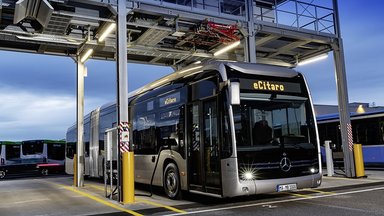
World premiere at Global Public Transport Summit 2023: Mercedes-Benz eCitaro fuel cell – greater range thanks to fuel cell
Download

World premiere at Global Public Transport Summit 2023: Mercedes-Benz eCitaro fuel cell – greater range thanks to fuel cell
Mercedes-Benz eCitaro fuel cell: economical solution for long route cycles Before production ramp-up: safety and functionality of the eCitaro fuel cell on the test bench Electromobility solutions, new data interface and digital services Leinfelden-Echterdingen / Barcelona – At Global Public Transport Summit (GPTS) 2023 from 4 to 7 June 2023, Daimler Buses will be showcasing the first series-production electric bus with fuel…
- Mercedes-Benz eCitaro fuel cell: economical solution for long route cycles
- Before production ramp-up: safety and functionality of the eCitaro fuel cell on the test bench
- Electromobility solutions, new data interface and digital services
Leinfelden-Echterdingen / Barcelona – At Global Public Transport Summit (GPTS) 2023 from 4 to 7 June 2023, Daimler Buses will be showcasing the first series-production electric bus with fuel cell as a range extender: the Mercedes-Benz eCitaro fuel cell. The new, zero-emissions regular-service bus combines vast range with high passenger capacity. In the articulated bus variant, available from June, the eCitaro fuel cell can run for around 350 kilometres without having to recharge, offering space for up to 128 passengers. The eCitaro fuel cell can thus seamlessly replace city buses with combustion engines. At the same time, it is the ideal addition for transport operators with an existing battery-electric fleet aiming to operating their long routes without having to recharge and without having to put on additional buses.
Mercedes-Benz eCitaro fuel cell: economical solution for long route cycles
The eCitaro fuel cell is based on a battery-electric drive system with NMC 3 high-performance batteries, while the fuel cell with an output of 60 kW serves as a hydrogen generator to extend the range. This combination enables particularly economical operation because electricity from the grid is available at a lower price than green hydrogen, and the sophisticated electronic control system regulates the mix of battery power and fuel cell operation in the best possible way. In contrast to a fully fledged hydrogen vehicle with a small buffer battery, the eCitaro fuel cell is also significantly better at completely and usefully storing the energy recovered during braking by recuperation in the large batteries. Last but not least, the vast battery capacity of at maximum 392 kWh in the articulated bus also enables high levels of drive output to be used over longer distances – for example on inclines in mountainous terrain – without the fuel cell having to operate in the top, inefficient power range. Thanks to the favourable weight distribution of batteries and fuel cells, this technology enables a high passenger capacity. Thanks to the long range, opportunity charging en route is not envisaged; charging is always carried out by plug at the depot. The development of this technology is supported by the German Federal Ministry for Digital Affairs and Transport with a total of 3.3 million euros as part of the National Innovation Programme for Hydrogen and Fuel Cell Technology (NOW). The funding guideline is coordinated by NOW GmbH and implemented by the project-executing agency Jülich (PtJ).
Before production ramp-up: Safety and functionality of the eCitaro fuel cell on the test bench
Before the launch of series production in June, the eCitaro had to pass numerous endurance and functional tests. The focus was on the new fuel cell and hydrogen system in particular. The hydrogen tanks have already been tested for fire, impact and temperature resistance in accordance with the new UN ECE R 134 standard. All components and also the fastening system on the roof underwent vibration and sled tests to simulate an impact. The new thermal management system, which profitably uses the heat input from the fuel cell, completed extensive laboratory and practical tests in extremely hot and extremely cold environments. The new components of the eCitaro fuel cell have successfully passed all tests.
Electromobility solutions, new data interface and digital services
In addition to the new eCitaro fuel cell, Daimler Buses will be exhibiting its service portfolio for electric bus operations at GPTS 2023. Experts advise customers on the switch to electromobility and even provide the charging infrastructure, charging management and fleet management on request. When operating electric buses in particular, the analysis of operating data for buses in order to optimise economic efficiency plays an increasingly important role. Daimler Buses is therefore one of the first vehicle manufacturers in Europe to offer the TiGR virtual data interface, an interface for remote bus monitoring in accordance with the universal, international standard defined by ITxPT. This enables transport operators with mixed fleets to use a homogeneous database for the entire fleet. For comprehensive analysis of bus operating data, the Omniplus On portal offers numerous functions from monitoring energy consumption to real-time remote diagnosis with the Omniplus On Uptime pro service. As a result of the new Omniplus eProcurement interfaces, customers' own ERP systems can be connected to the Omniplus eShop, which makes the procurement of spare parts much easier. Training courses and eService contracts supplement Omniplus' extensive range.
Article assets

World premiere at Global Public Transport Summit 2023: Mercedes-Benz eCitaro fuel cell – greater range thanks to fuel cell

World premiere at Global Public Transport Summit 2023: Mercedes-Benz eCitaro fuel cell – greater range thanks to fuel cell

World premiere at Global Public Transport Summit 2023: Mercedes-Benz eCitaro fuel cell – greater range thanks to fuel cell

World premiere at Global Public Transport Summit 2023: Mercedes-Benz eCitaro fuel cell – greater range thanks to fuel cell

World premiere at Global Public Transport Summit 2023: Mercedes-Benz eCitaro fuel cell – greater range thanks to fuel cell

World premiere at Global Public Transport Summit 2023: Mercedes-Benz eCitaro fuel cell – greater range thanks to fuel cell
World premiere at Global Public Transport Summit 2023: Mercedes-Benz eCitaro fuel cell – greater range thanks to fuel cell

Nada Filipovic
Spokesperson Mercedes-Benz Buses
nada.filipovic@daimlertruck.com
+49 160 8614813

Peter Smodej
Head of Communications Product & Corporate Mercedes-Benz Trucks / Daimler Buses
peter.smodej@daimlertruck.com
+49 176 30936446







